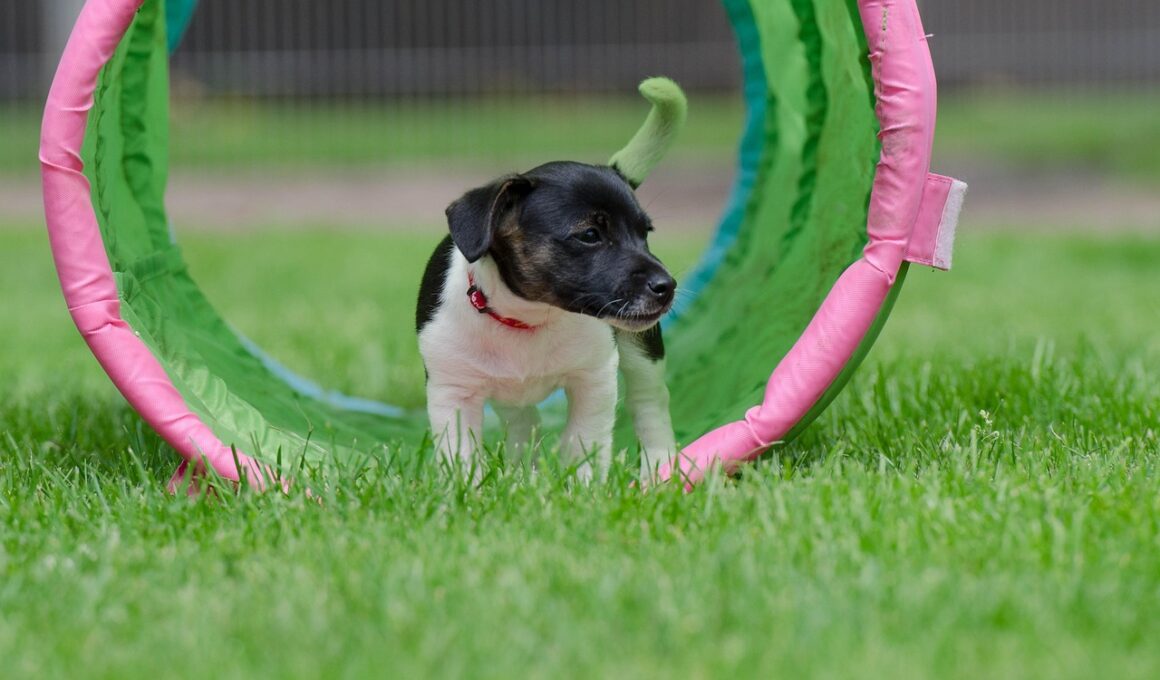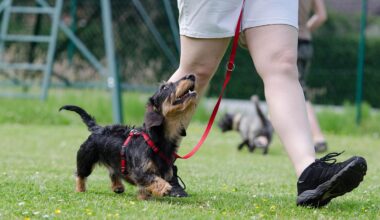Puppy Socialization Mistakes to Avoid
Socializing a puppy is crucial for its development, but many owners make critical mistakes that can hinder their dog’s growth. One common mistake is failing to start socialization early. Puppies are most receptive during their first few months, and exposing them to various experiences can prevent behavioral issues later in life. Another mistake is exposing puppies to overwhelming situations. Gradual exposure to new experiences and environments can help them adjust without fear. Moreover, neglecting to properly introduce the puppy to different types of people, including children and seniors, can lead to fear and anxiety. Be mindful of how these encounters unfold, ensuring they are positive. Additionally, limiting socialization to only dogs at an early age can cause problems. Your puppy should meet a variety of other animals. This is essential to prevent aggressive behavior and anxiety around unfamiliar animals. Lastly, expecting too much too soon can be detrimental. It’s essential to be patient and understanding as your puppy learns how to navigate this complex world. Always remember to use positive reinforcement during training to encourage good behavior and confidence.
The Role of Positive Reinforcement
Positive reinforcement plays a significant role in effective puppy socialization. Encouragement through treats, praise, or play after successful interactions boosts a puppy’s confidence. One error that owners often make is using negative reinforcement or punishment, which can lead to fear and anxiety in social situations. Instead of scaring your puppy, reward achievements and loved interactions with others, which fosters a more secure and well-adjusted dog. Furthermore, consistency in training is paramount. It’s important to set clear rules about interactions. Dogs are creatures of habit and thrive on predictability. When owners inconsistently enforce rules, puppies can become confused and anxious. Taking the time to develop routine socialization opportunities also significantly contributes to your puppy’s comfort. Regular trips to the park or supervised play dates can feel less daunting when they become familiar experiences. Lastly, pay close attention to your puppy’s body language during social interactions. Understanding when your puppy is feeling overwhelmed or uneasy is essential for adjusting approaches during socialization. By carefully managing interactions and providing a supportive environment, you can help your puppy grow into a well-adjusted adult dog.
A common socialization mistake includes overwhelming environments, where puppies can become scared or anxious. Gradual introductions to new experiences, sounds, and environments help reduce stress. Owners must be attentive to their puppy’s reactions; excessive stimulation can lead to adverse reactions and behaviors. Introducing multiple stimuli at once can lead to fear-based aggression or other behavioral issues that manifest later in life. Therefore, focus on quality, not quantity, when socializing your puppy. Try breaking down experiences into smaller steps. Create positive associations with each encounter. This would ensure your puppy progresses at a comfortable pace without feeling overwhelmed. Additionally, keep socialization sessions brief to maintain your puppy’s interest and reduce stress levels. Frequent, short interactions during formative months set your puppies up for future success. Lastly, balance play with training during these experiences. Both can be incorporated to enhance learning while fostering strong relationships. Regular training sessions that engage your puppy’s mind can complement socialization efforts. Owners can invite friends and family to help during training routines, providing an essential balance between playtime and training, while creating lasting bonds and creating a solid foundation for their dog’s social skills.
The Importance of Timing
Proper timing during socialization is another area where mistakes often occur. Socialization events held at inappropriate times, such as during periods of high stress for the puppy, can lead to negative associations. Ensure that your puppy is well-rested, fed, and in a calm environment before exposure to new experiences. Promoting positive encounters during lower stress periods encourages easier engagement and less likelihood of scaring your dog. Moreover, pay attention to your puppy’s energy levels throughout the day. Young puppies have their prime active times and need sufficient breaks to recharge. You can also use these insights to schedule socialization activities during peak energy levels, making them more engaging for the puppy. Skipping or rushing socialization sessions can have lasting effects, as consistency is vital for learning. Regular encounters, particularly in the first three months, solidify beneficial experiences. Gradually expand their social circle, allowing your dog to meet different breeds as well as various environments, enhancing adaptability and future confidence. Ultimately, successful timing allows cleaner learning in socialization, setting your puppy up for success as a well-adjusted companion.
Another significant mistake involves introducing your puppy to too many dogs at once during playdates or outings. Initial meetings should be with one or two stable, friendly dogs who promote proper behavior. Overcrowded situations can overwhelm puppies, making them fearful or anxious about future encounters. Ensuring that interactions begin with smaller groups encourages less stressful experiences. Puppy plays in larger mobs can lead to chaos, resulting in unintended bad behaviors that scar puppies’ first social encounters. Furthermore, the breed of dogs your puppy interacts with matters. Pick companions that exhibit positive social behaviors to foster good habits. Transitioning from one-on-one playdates to larger gatherings can be made seamless by ensuring everyone involved understands proper play etiquette. This includes observing signs of stress or discomfort in your puppy. Regularly circling back to positive memories ensures your puppy enjoys their time spent with other dogs. As your puppy grows, continue to build on positive encounters with larger groups, making future interactions enjoyable. Always be prepared to intervene if necessary, and focus on promoting affirmative interactions to turn every outing into an enjoyable experience.
Socializing with Different Environments
Neglecting varying environments is another frequent error made by puppy owners. Familiarizing your puppy with diverse settings such as busy streets, parks, or even homes of friends can mitigate fear of new surroundings that manifest later in life. Starting socialization at home is great, but it should transition to wider experiences. Incorporating exposure to common sights, sounds, and smells allows your puppy to learn how to adapt and react appropriately. Ensure every experience is positive; promoting exploration while maintaining comfort. Going on walks in neighborhoods introduces various distractions that help reinforce confidence. Always ensure that these new settings are not overwhelming, allowing you to observe your puppy’s comfort levels. You can provide treats and encouragement as they explore the new surroundings. Also, take time to visit pet-friendly businesses, such as pet stores, and socialize with your puppy in other venues. This helps them learn how to behave appropriately in different settings. Gradually introducing your puppy to diverse environments builds strong, adaptable dogs, giving them the confidence they need to tackle new challenges as they grow older.
The puppy socialization process is essential and often misunderstood. Maintaining a balance between exposing them to various experiences while avoiding overwhelming situations is crucial. By being mindful of timing, environment, and companionship introduced and leveraging positive reinforcement, owners can significantly enhance the development of their furry friends. Each interaction shapes your puppy’s character. Mistakes made during socialization can have lasting impacts on behavior as they grow. Aim for quality experiences that prioritize the wellbeing of your puppy. Allocate adequate time to ensure smooth transitions into different settings without inducing fear or stress. Remember to celebrate small victories during socialization efforts; it reinforces the idea that engaging with the world is a positive, rewarding experience. Owners should also educate themselves on dog body language and behavior to identify signs of stress or discomfort. Ultimately, the responsibility falls on pet owners to create positive memories through constructive socialization. Working together with a veterinarian or professional dog trainer can help mitigate risks. It is essential to approach the puppy socialization journey with care and thoughtfulness. Socializing your puppy effectively lays the groundwork for a happy, well-adjusted adult dog.


